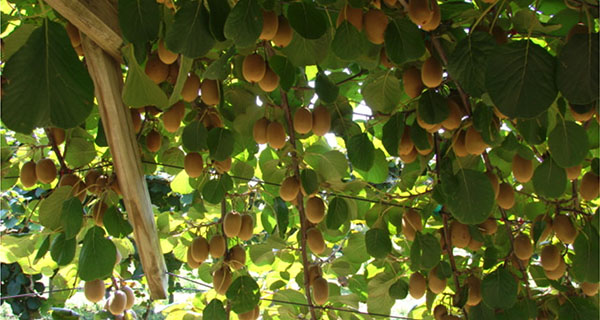| About | Students | Future Students | Alumni | Faculty/Staff |
3/4/2013
| AU Golden Sunshine kiwifruit is among the Auburn-patented varieties now available. |
Licensing Deal Moves AU-Patented Kiwifruit into Marketplace
AUBURN, Ala.—Auburn University–patented kiwifruit varieties are now on the market, offering home gardeners across central and south Alabama a new and refreshing fruit possibility and the region’s produce farmers a promising high-value specialty crop.
Included among those varieties are a “traditional” kiwifruit—the fuzzy, egg-shaped fruit with bright-green, seed-studded flesh and a distinctive sweet-tart taste—and a couple of yellow-fleshed varieties characterized by smooth skin and a smooth, sweet flavor. They are the “goldens.”
“The first gold kiwi I had, as soon as I tasted it, I knew it was something that would be a hit,” says Wayne Bassett, owner of Beck’s Turf and The Wildlife Group in Macon County. So strongly did he believe in the fruit’s potential that, working through Auburn’s Office of Technology Transfer, he licensed the patented varieties and now has exclusive rights to sell the kiwifruit vines through a newly established entity, Gold Kiwi Group LLC.
The kiwifruit varieties available from Gold Kiwi Group include AU Golden Dragon and AU Golden Sunshine—the gold-fleshed cultivars, obviously—and the green-fleshed AU Fitzgerald. Also available are the pollinators for these three female plants: AU Golden Tiger for Golden Sunshine, AU Arthur for Fitzgerald and, for AU Golden Dragon, an existing kiwifruit variety called Hortkiwi meteor. Bassett says one male will pollinate up to four females.
Kiwifruit, which are native to China, are vines that can reach up to 25 feet, so they must be grown on trellises to support the sheer weight of the branches and, when they start bearing in year three or four, the fruit. Tips for building the support structures as well as information about each variety and the how-tos of planting, fertilizing, irrigating and pruning kiwifruit vines, whether two or 200, are provided on Gold Kiwi Group’s website at http://growaukiwi.info. The information is based on extensive research Alabama Ag Experiment Station researchers launched in 1985.
Spearheaded by now-retired horticulture professor Billy Dozier, Auburn’s kiwifruit research project was aimed at determining whether the subtropical fruit could be grown in Alabama, not merely in home landscapes but as a commercial crop for fruit and vegetable producers.
The initial research was limited to traditional green-fleshed kiwifruit varieties, but in the early 1990s, Dozier and team added two golden varieties—Dragon and Sunshine—that had been developed at Hubei Academy of Agricultural Sciences’ Institute of Fruit and Tea in China to the scientific trials. As was the case with the green-fleshed varieties, the goldens proved, and continue to prove, hardy and prolific.
The golden cultivars’ outstanding performance in Alabama, along with their sweeter, smoother taste and fuzz-less skin, have made them the scientists’ and, in taste tests, consumers’ kiwifruit of choice and the ones Dozier predicts will be the mainstay of a commercial kiwifruit industry in the state, should one be established.
Making the two golden fruits even sweeter is the nutritional analysis conducted by Auburn horticulture’s Floyd Woods, an associate professor specializing in post-harvest physiology.
“It is known that kiwifruit in general are nutritional powerhouses—extremely high in beta carotene, polyphenols and vitamins C and E—but we compared AU Golden Dragon, AU Golden Sunshine and an industry-standard golden variety against two green-fleshed varieties and found the antioxidants of the yellow-fleshed kiwifruit provide significantly higher cellular protection from free radicals than the green-fleshed,” Woods says.
The AAES’ Chilton Research and Extension Center in Clanton has been home base for the kiwifruit project and center director Jim Pitts a key player, but broader field trials indicate Auburn-patented kiwifruit varieties can be successfully grown from Birmingham southward to Fairhope and from East Texas to South Carolina.
“Basically, anywhere peaches grow, you can grow kiwi,” he says.
For information on purchasing AU-patented kiwifruit vines, contact Gold Kiwi Group at info@goldkiwigroup.com or 1-800-288-4291.
# # #
OFFICE OF AG COMMUNICATIONS & MARKETING
Auburn University College of Agriculture
Alabama Agricultural Experiment Station
3 COMER HALL, AUBURN UNIVERSITY
AUBURN, AL 36849
334-844-2783 (PHONE) 334-844-5892 (FAX)
AgComm@auburn.edu






